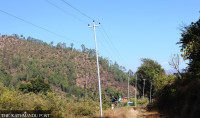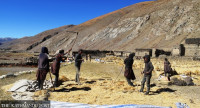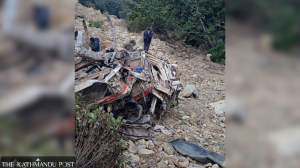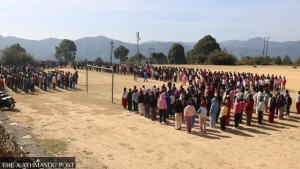Karnali Province
Ban on yarsagumba collection worries Karnali residents
Authorities have prohibited people from picking the precious fungus in light of the second wave of the pandemic that has gripped the country.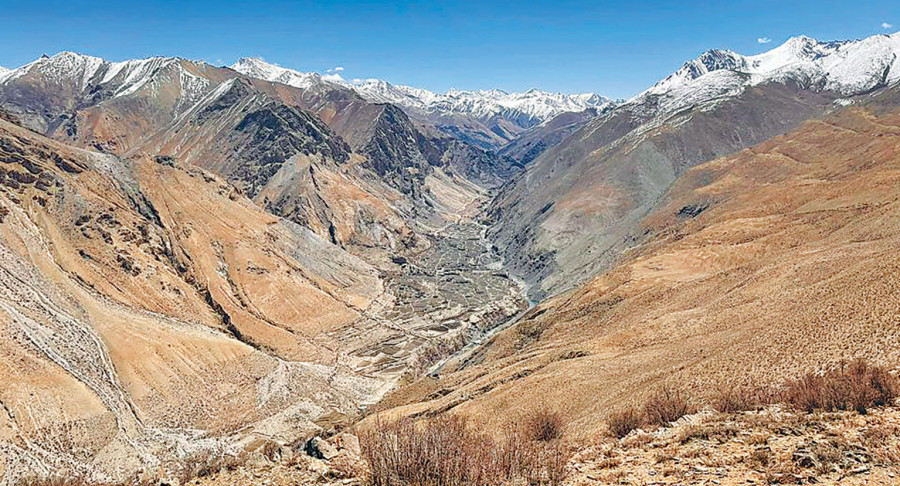
Bhim Bahadur Singh, Raj Bahadur Shahi & Hari Gautam
Under normal circumstances, Ram Bahadur Singh of Nayakbada in Barekot Rural Municipality, Jajarkot, would be busy collecting yarsagumba in the highlands of Dolpa district at this time of the year. But with Covid-19 restrictions in place, he may not be able to collect yarsa, the caterpillar fungus (Cordyceps sinensis), this season.
“My family survives on the money I make from collecting yarsagumba. But this year, I could not go to the highlands to collect yarsa. I am very worried. I don’t know how to feed my family without the money I get from yarsa picking,” Singh says.
Yarsagumba picking is the main source of income for many families in the mountain districts of Karnali. However, since last year, when the first wave of the Covid-19 pandemic hit the country, people in Karnali Province have been unable to collect the precious herb and this has put their livelihoods in jeopardy.
Yarsagumba is harvested before the monsoon season, between May and June, at elevations between 3,000 and 5,000 metres in the Himalayan foothills of Dolpa, Mugu, Bajhang and other districts of the western region. It is the world’s most expensive medicinal fungus and can fetch as much as $100 per gram in the Chinese market, making it more expensive than gold, according to reports. The herb is used to cure anaemia, chest and lung infections, tuberculosis, Hepatitis B and kidney and liver diseases.
In Dolpa, around 20,000 to 30,000 individuals used to climb up the highlands in search of yarsagumba every year. This year, the highland was opened for yarsa collection from April 23. However, the government authorities later imposed a ban on herb collection as the country was gripped by the second wave of the pandemic.
“We used to risk our lives while collecting the herb. It was the only means of generating income for us. But the pandemic has put our livelihoods at risk,” said Singh. “We had even stopped going to India in search of jobs, as we made good income from yarsa sales.”
Pratap Chunara, a resident of Katke in Ward No. 3 of Nalgad Municipality, says the villagers can neither go to India for jobs nor can they collect yarsagumba this season due to the pandemic.
“None of my family members has a job. The Covid-19 pandemic has greatly affected us,” said Chunara.
People from Mukot, Dho, Phoksundo, Tinje, Kharka, Saltang and Mijer of Upper Dolpa collect yarsagumba for a living. Schools are closed and students and teachers alike climb up the highlands to pick yarsa every year during the harvest season. Most of the families used to make anywhere between Rs 60,000 to Rs 600,000 through yarsagumba sales.
“Agriculture is difficult in the highlands due to adverse climate and rough terrain. So we pick and sell yarsagumba for a living. But now, with the ban in place, we don’t know how to manage food for our families,” said Pema Gurung, a resident of Dolpobuddha Rural Municipality.
Only potato, wheat and uwa can be grown in Upper Dolpa—a remote region in the Karnali Province that is not connected with the road network—and the local food production is not enough to feed the villagers.
According to Karma Lama, the ward chairman of Dolpobuddha-5, the local agricultural production can hardly last for six months for the villagers.
“The local people cannot survive if they are deprived of foraging and selling yarsagumba. The people’s representatives are very concerned for the villagers,” said Lama.
The local residents of Dolpa had requested government authorities to allow them to collect yarsagumba this year. As per their request, the meeting of the District Covid-19 Crisis Management Centre held on April 30 decided to allow the collection of yarsagumba from May 24. But the decision was withdrawn, citing an increasing number of coronavirus cases in the district.
“The risk is too high so we had to impose a ban on yarsagumba collection,” said Ganesh Bahadur Shahi, the mayor of Thulibheri Municipality in Dolpa.
In Jajarkot, many people are planning to go to India for work as they could not pick yarsagumba in the highlands this season.
“After things get back to normal, I will go to India and find a job since I could not earn any money from yarsagumba sales this year,” said Chunara from Nalgad Municipality in Jajarkot.
However, despite the ban on yarsagumba collection, there are reports of some people reaching the highlands by hoodwinking the security personnel and the people’s representatives.
“We have been notified about the issue. We will take action against anyone found flouting the rules,” said Chhiring Kyapne Lama, the chairman of Mugumkarmarong Rural Municipality in Mugu.




 13.12°C Kathmandu
13.12°C Kathmandu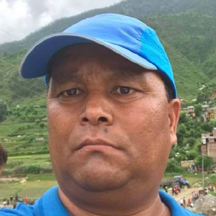
.jpg)
.jpg)




